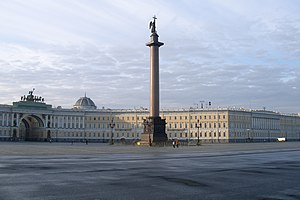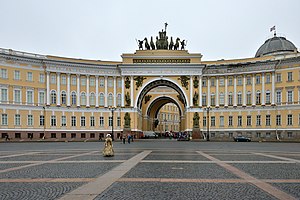Country:
Region:
City:
Latitude and Longitude:
Time Zone:
Postal Code:
IP information under different IP Channel
ip-api
Country
Region
City
ASN
Time Zone
ISP
Blacklist
Proxy
Latitude
Longitude
Postal
Route
Luminati
Country
ASN
Time Zone
Europe/Moscow
ISP
Citytelecom LLC
Latitude
Longitude
Postal
IPinfo
Country
Region
City
ASN
Time Zone
ISP
Blacklist
Proxy
Latitude
Longitude
Postal
Route
db-ip
Country
Region
City
ASN
Time Zone
ISP
Blacklist
Proxy
Latitude
Longitude
Postal
Route
ipdata
Country
Region
City
ASN
Time Zone
ISP
Blacklist
Proxy
Latitude
Longitude
Postal
Route
Popular places and events near this IP address

Palace Square
Central city square of St Petersburg, Russia
Distance: Approx. 115 meters
Latitude and longitude: 59.93916667,30.31583333
Palace Square (Russian: Дворцо́вая пло́щадь, romanized: Dvortsovaya Ploshchad, IPA: [dvɐrˈtsovəjə ˈploɕːɪtʲ]), connecting Nevsky Prospekt with Palace Bridge leading to Vasilievsky Island, is the central city square of St Petersburg and of the former Russian Empire. Many significant events took place there, including the Bloody Sunday massacre and parts of the October Revolution of 1917. Between 1918 and 1944, it was known as Uritsky Square (Russian: площадь Урицкого), in memory of the assassinated leader of the city's Cheka branch, Moisei Uritsky.

Alexander Column
Red Square Monument
Distance: Approx. 115 meters
Latitude and longitude: 59.93916667,30.31583333
The Alexander Column (Russian: Алекса́ндровская коло́нна, Aleksandrovskaya kolonna), also known as Alexandrian Column (Russian: Александри́йская коло́нна, Aleksandriyskaya kolonna), is the focal point of Palace Square in Saint Petersburg, Russia. The monument was raised after the Russian victory in the war with Napoleon's France. The column is named for Emperor Alexander I of Russia, who reigned from 1801 to 1825.
Wawelberg Bank building
Bank building in St. Petersburg, Russia
Distance: Approx. 217 meters
Latitude and longitude: 59.93665,30.314198
The Wawelberg Bank Building in St. Petersburg, Russia was built by the Wawelbergs - a prominent Polish banking family active in the Russian Empire. Although this building bears initials HW (Hipolit Wawelberg), it was commissioned by his son, Michael Wawelberg.

Winter Palace
Former imperial palace in Saint Petersburg, Russia
Distance: Approx. 201 meters
Latitude and longitude: 59.9404,30.3139
The Winter Palace is a palace in Saint Petersburg that served as the official residence of the House of Romanov, previous emperors, from 1732 to 1917. The palace and its precincts now house the Hermitage Museum. The floor area is 233,345 square metres (it has been calculated that the palace contains 1,886 doors, 1,945 windows, 1,500 rooms and 117 staircases).

Gardens of the Winter Palace
Distance: Approx. 175 meters
Latitude and longitude: 59.9394,30.3114
The gardens of the Winter Palace, St Petersburg, are little known, as the great imperial palace of the Romanovs was never intended to have gardens. As the Tsar's principal residence, situated in the capital, it was very much intended as a symbol of power rather than a place of relaxation and pleasure. Bordered by the River Neva on its northern side and Palace Square on its southern, the Winter Palace was devoid of space for gardens; however, the last two empresses of Russia each created gardens from previously paved areas.

General Staff Building (Saint Petersburg)
Distance: Approx. 182 meters
Latitude and longitude: 59.9381,30.3172
The General Staff Building (Russian: Здание Главного штаба, Zdanie Glavnogo Shtaba) is an edifice with a 580 m long bow-shaped facade, situated on Palace Square in Saint Petersburg, Russia, in front of the Winter Palace. The monumental Neoclassical building was designed by Carlo Rossi in the Empire style and built in 1819–1829. It consists of two wings, which are separated by a tripartite triumphal arch adorned by sculptors Stepan Pimenov and Vasily Demuth-Malinovsky and commemorating the Russian victory over Napoleonic France in the Patriotic War of 1812.

Neva Enfilade of the Winter Palace
Distance: Approx. 201 meters
Latitude and longitude: 59.9404,30.3139
The Neva Enfilade of the Winter Palace, St Petersburg, is a series of three large halls arranged in an enfilade along the palace's massive facade facing the River Neva. Originally designed as a series of five state rooms by the architect Francesco Rastrelli in 1753, they were transformed into an enfilade of three vast halls in 1790 by Giacomo Quarenghi. Following a fire in 1837 they were rebuilt under the direction of Vasily Stasov.

Fire in the Winter Palace
1837 fire in Saint Petersburg, Russian Empire
Distance: Approx. 201 meters
Latitude and longitude: 59.9404,30.3139
The fire in the Winter Palace of Saint Petersburg, then the official residence of the Russian emperors, occurred on December 17, 1837, and was caused by soot inflammation. The Palace burned for three days, and the glow was visible for 50–70 versts (50–75 km / 30–45 mi). Thirty guardsmen died in the fire, although nearly all the items were saved (notably the imperial throne, guards banners, portraits of Russian generals from the Field Marshals' Hall and Military Gallery and the utensils of the Grand Church).
Anglo-American School of St. Petersburg
Distance: Approx. 115 meters
Latitude and longitude: 59.939,30.316
The Anglo American School of St. Petersburg (AASSP), located in Saint Petersburg, Russia, was a branch of the Anglo-American School of Moscow (AAS). It was an independent, non-profit, co-educational day school that served students from Kindergarten through Grade 12.

Private Apartments of the Winter Palace
Distance: Approx. 201 meters
Latitude and longitude: 59.9404,30.3139
The Private Apartments of the Winter Palace are sited on the piano nobile of the western wing of the former imperial palace, the Winter Palace in St Petersburg. Access to the private rooms, for members of the imperial family, from the exterior was usually through the Saltykov Entrance (centre in the photograph to the right) which was reserved for use by only the Tsar, Tsaritsa and grand dukes and grand duchesses. A second access was through a discrete box-like porch, on the western end of the palace's Neva façade.

Western Military District
Former operational strategic command of the Armed Forces of the Russian Federation
Distance: Approx. 182 meters
Latitude and longitude: 59.9381,30.3172
The Western Military District (Russian: Западный военный округ, romanized: Zapadnyy voyennyy okrug) was a military district of Russia, in existence from 2010 until its abolishment as a unitary military command on February 26, 2024, succeeded by the newly reconstituted Moscow Military District and Leningrad Military District. It was one of the five military districts of the Russian Armed Forces, with its jurisdiction primarily within the western central region of European Russia. The Western Military District was created as part of the 2008 military reforms, and founded by Presidential Decree №1144 signed on 20 September 2010, as an amalgamation of the Moscow Military District, Leningrad Military District and Kaliningrad Special Region.
The State Hermitage Youth Education Center
Contemporary art centre in Saint Petersburg, Russia
Distance: Approx. 187 meters
Latitude and longitude: 59.94027778,30.31388889
The State Hermitage Youth Education Center (Russian: Молодёжный образовательный центр Государственного Эрмитажа), is a contemporary art education program in Saint Petersburg, Russia that is part of The Hermitage Museum. The program is offered for all students, whether from St. Petersburg, other Russian cities or from abroad.
Weather in this IP's area
overcast clouds
8 Celsius
5 Celsius
8 Celsius
8 Celsius
1029 hPa
90 %
1029 hPa
1028 hPa
10000 meters
6 m/s
270 degree
100 %
08:39:10
16:45:56

